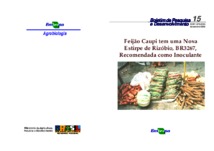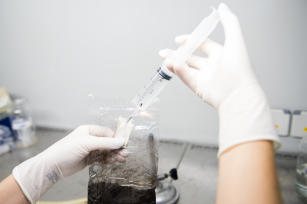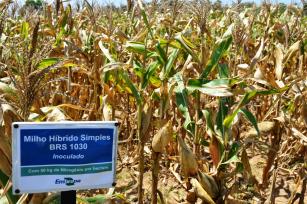Feijão-caupi tem uma nova estirpe de rizóbio, BR3267, recomendada como inoculante.
Feijão-caupi tem uma nova estirpe de rizóbio, BR3267, recomendada como inoculante.
Author(s): RUMJANEK, N. G.; XAVIER, G. R.; MARTINS, L. M. V.; MORGADO, L. B.; NEVES, M. C. P.
Summary: A recomendação de estirpes para uso como inoculante microbiano de interesse agrícola, depende de uma análise técnica da eficiência agronômica dessas bactérias. Novas estirpes podem ser aprovadas como provisórias ou definitivas, dependendo do impacto dos resultados dos testes. A adoção de tecnologias sustentáveis que permitam conservação dos recursos naturais e promovam uma melhoria na qualidade de vida da população configura-se como um componente importante para garantir cidadania e dignidade a agricultores. Dentro desse contexto, a inoculação de estirpes de rizóbio em leguminosas pode suprir em parte ou totalmente a necessidade de nitrogênio da cultura através do processo de fixação biológica de nitrogênio (FBN). O feijão-caupi é capaz de se beneficiar do N proveniente deste processo biológico. É necessária entretanto, a inoculação de estirpes eficientes e adaptadas às condições regionais. A partir de testes de seleção de estirpes foi observado que a estirpe BR 3267 apresentou ganhos de produtividade na cultura do feijão-caupi. Os incrementos alcançaram patamares de até 40% em condição experimentais de campo e de até 52% nas áreas de agricultores experimentadores. Como forma de regulamentar a questão, recentemente o MAPA, em 2006, através da Secretaria de Defesa Agropecuária, instrução normativa n° 10, reconheceu a estirpe BR3267 (SEMIA 6462) na relação dos microrganismos autorizados para produção de inoculantes para feijão-caupi no Brasil. Recommendation of Rhizobium strains to be used as agricultural inoculant depends on the technical analysis of the agronomic efficiency of the bacteria. New strains may be recommended as temporary or permanent, depending on how promising are the research results. The adoption of sustainable technologies, which enables to preserve the natural resources and improves the life quality of the population, appears as an important component to provide citizenship and dignity for the farmers. In that context, the inoculation of leguminous plants with Rhizobium strains can supply partially or totally the crop nitrogen needs by the process of biological nitrogen fixation (BNF). Cowpea is able to benefit of the N resulting from this biological process. However, it is necessary to inoculate the leguminous seeds with efficient strains adapted to the regional environmental conditions. Results from selecting strain test showed that the strain BR 3267 promoted productivity gains in cowpea. Increases corresponded to 40% at field experiment level and to 52% in validation area at farm level. As a way for regulating the situation, the MAPA, in 2006, through the Secretary for Animal Control, normative instruction n° 10, recognized the strain BR 3267 (SEMIA 6462) in the authorized microorganism list for producing inoculants for cowpea in Brazil.
Publication year: 2006
Types of publication: Booklets
Unit: Embrapa Agrobiology
Keywords: Caupi, FBN, Feijão, Feijão-de-corda, Fixação biológica de nitrogênio, Rhizobium, Semi-árido, Vigna Unguiculata
Observation
Some of Embrapa's publications are published as ePub files. To read them, use or download one of the following free software options to your computer or mobile device. Android: Google Play Books; IOS: iBooks; Windows and Linux: Calibre.
Access other publications
Access the Agricultural Research Database (BDPA) to consult Embrapa's full library collection and records.
Visit Embrapa Bookstore to purchase books and other publications sold by Embrapa.



